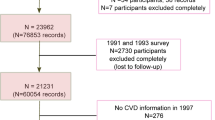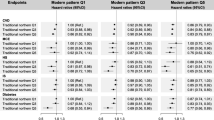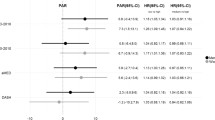Abstract
Background
Dietary patterns can be identified by a priori and a posterior approaches. Limited data have related dietary patterns with stroke risk in Chinese population. This study examined stroke risk associated with patterns identified by both approaches.
Methods
Data on 1,338 Chinese men and 1,397 Chinese women aged >= 65 years participating in a cohort study examining the risk factors for osteoporosis in Hong Kong were analyzed. Baseline dietary data were collected between 2001 and 2003 using a validated food frequency questionnaire. Adherence to a priori dietary patterns including the Mediterranean Diet Score (MDS) and the Dietary Approaches to Stop Hypertension (DASH) was assessed. Factor analysis (FA) identified three a posterior dietary patterns: “vegetables-fruits”, “snacks-drinks-milk products”, and “meat-fish”. Data on incidence of stroke were retrieved from an official database in 2008. Cox regression was used to estimate hazard ratios (HRs) for stroke risk adjusted for potential confounders.
Results
There were 156 incident stroke events during a median follow up of 5.7 years. A posterior dietary patterns derived by FA were not associated with risk of incident stroke in either men or women. MDS was inversely associated with risk of incident stroke [Adjusted HR=0.55 (95% CI: 0.31–0.99) of the highest level of MDS compared with the lowest level, ptrend=0.008] in men but not in women. Similar non-significant inverse association was observed between DASH accordance and stroke risk in men [Multivariate HR (95% CI) of the DASH score of >=4.5 = 0.62 (0.38–1.04) compared with the DASH score of <=4, ptrend = 0.068] but not in women.
Conclusion
Our findings suggest that higher MDS and possibly higher DASH scores were associated with lower stroke risk in Chinese older people in Hong Kong.
Similar content being viewed by others
References
Feigin VL, Krishnamurthi R. Public health strategies could reduce the global stroke epidemic. Lancet Neurol. 2010;9:847–848.
Silver FL, Norris JW, Lewis AJ, Hachinski VC. Early mortality following stroke: a prospective review. Stroke 1984;15:492–496.
Liu S, Manson JE, Stampfer MJ, Rexrode KM, Hu FB, Rimm EB, Willett WC. Whole grain consumption and risk of ischemic stroke in women: A prospective study. JAMA 2000;284:1534–1540.
Joshipura KJ, Ascherio A, Manson JE, Stampfer MJ, Rimm EB, Speizer FE, Hennekens CH, Spiegelman D, Willett WC. Fruit and vegetable intake in relation to risk of ischemic stroke. JAMA 1999;282:1233–1239.
Hu FB, Rimm EB, Stampfer MJ, Ascherio A, Spiegelman D, Willett WC. Prospective study of major dietary patterns and risk of coronary heart disease in men. Am J Clin Nutr. 2000;72:912–921.
Hu FB. Dietary pattern analysis: a new direction in nutritional epidemiology. Curr Opin in Lipidol. 2002;13:3–9.
van Dam RM. New approaches to the study of dietary patterns. Br J Nutr. 2005;93:573–574.
Waijers PM, Feskens EJ, Ocke MC. A critical review of predefined diet quality scores. Br J Nutr. 2007;97:219–231.
Schulze MB, Hoffmann K. Methodological approaches to study dietary patterns in relation to risk of coronary heart disease and stroke. Br J Nutr. 2006;95:860–869.
Sherzai A, Heim LT, Boothby C, Sherzai AD. Stroke, food groups, and dietary patterns: a systematic review. Nutr Rev. 2012;70:423–435.
Agnoli C, Krogh V, Grioni S, Sieri S, Palli D, Masala G, Sacerdote C, Vineis P, Tumino R et al. A priori-defined dietary patterns are associated with reduced risk of stroke in a large Italian cohort. J Nutr. 2011;141:1552–1558.
Gardener H, Wright CB, Gu Y, Demmer RT, Boden-Albala B, Elkind MS, Sacco RL, Scarmeas N. Mediterranean-style diet and risk of ischemic stroke, myocardial infarction, and vascular death: the Northern Manhattan Study. Am J Clin Nutr. 2011;94:1458–1464.
Fung TT, Stampfer MJ, Manson JE, Rexrode KM, Willett WC, Hu FB. Prospective study of major dietary patterns and stroke risk in women. Stroke 2004;35:2014–2019.
Nettleton JA, Polak JF, Tracy R, Burke GL, Jacobs DR, Jr. Dietary patterns and incident cardiovascular disease in the Multi-Ethnic Study of Atherosclerosis. Am J Clin Nutr. 2009;90:647–654.
Li Y, He Y, Lai J, Wang D, Zhang J, Fu P, Yang X, Qi L. Dietary patterns are associated with stroke in Chinese adults. J Nutr. 2011;141:1834–1839.
Wong SY, Kwok T, Woo J, Lynn H, Griffith JF, Leung J, Tang YY, Leung PC. Bone mineral density and the risk of peripheral arterial disease in men and women: results from Mr. and Ms Os, Hong Kong. Osteoporos Int. 2005;16:1933–1938.
Census and Statistics Department. Hong Kong 2006 Population By-census Thematic Report: Older Persons. Hong Kong: Census and Statistics Department; 2006.
Marmot M, Wilkinson RG. Psychosocial and material pathways in the relation between income and health: a response to Lynch et al. BMJ 2001;322:1233–1236.
Woo J, Lynn H, Leung J, Wong SY. Self-perceived social status and health in older Hong Kong Chinese women compared with men. Women & Health 2008;48:209–234.
Washburn RA, Smith KW, Jette AM, Janney CA. The Physical Activity Scale for the Elderly (PASE): development and evaluation. J Clin Epidemiol. 1993;46:153–162.
Woo J, Leung SSF, Ho SC, Lam TH, Janus ED. A food frequency questionnaire for use in the Chinese population in Hong Kong: Description and examination of validity. Nutr Res. 1997;17:1633–1641.
Paul AA, Southgate DAT. McCance & Widdowson’s: The Composition of Foods. 4th ed. London: HMSO; 1978.
Yang Y, Wang G, Pan X. China Food Composition 2002. 2002 ed. Peking: University Medical Press; 2002.
Chan R, Chan D, Woo J. Associations between dietary patterns and demographics, lifestyle, anthropometry and blood pressure in Chinese community-dwelling older men and women. J Nutr Sci. 2012 (in press).
Reedy J, Wirfalt E, Flood A, Mitrou PN, Krebs-Smith SM, Kipnis V, Midthune D, Leitzmann M, Hollenbeck A, et al. Comparing 3 dietary pattern methods—cluster analysis, factor analysis, and index analysis—With colorectal cancer risk: The NIHAARP Diet and Health Study. Am J Epidemiol. 2010;171:479–487.
Field A. Discovering Statistics Using SPSS. 1st ed. London: Sage Publications; 2005.
Trichopoulou A, Costacou T, Bamia C, Trichopoulos D. Adherence to a Mediterranean diet and survival in a Greek population. New Engl J Med. 2003;348:2599–2608.
Mellen PB, Gao SK, Vitolins MZ, Goff DC, Jr. Deteriorating dietary habits among adults with hypertension: DASH dietary accordance, NHANES 1988–1994 and 1999–2004. Arch Int Med. 2008;168:308–314.
Hospital Authority of Hong Kong. Hospital Authority Statistical Report 1998/99 to 2009/10. Hong Kong SAR: Hospital Authority of Hong Kong; 2010.
Osler M, Schroll M. Diet and mortality in a cohort of elderly people in a north European community. Int J Epidemiol. 1997;26:155–159.
Mahe G, Ronziere T, Laviolle B, Golfier V, Cochery T, De Bray JM, Paillard F. An unfavorable dietary pattern is associated with symptomatic ischemic stroke and carotid atherosclerosis. J Vasc Surg. 2010;52:62–68.
Shimazu T, Kuriyama S, Hozawa A, Ohmori K, Sato Y, Nakaya N, Nishino Y, Tsubono Y, Tsuji I. Dietary patterns and cardiovascular disease mortality in Japan: a prospective cohort study. Int J Epidemiol. 2007;36:600–609.
Panagiotakos D, Pitsavos C, Chrysohoou C, Palliou K, Lentzas I, Skoumas I, Stefanadis C. Dietary patterns and 5-year incidence of cardiovascular disease: a multivariate analysis of the ATTICA study. Nutr Metab Cardiovasc Dis. 2009;19:253–263.
Sofi F, Abbate R, Gensini GF, Casini A. Accruing evidence on benefits of adherence to the Mediterranean diet on health: an updated systematic review and meta-analysis. Am J Clin Nutr. 2010;92:1189–1196.
Martinez-Gonzalez MA, Sanchez-Villegas A, De Irala J, Marti A, Martinez JA. Mediterranean diet and stroke: objectives and design of the SUN project. Seguimiento Universidad de Navarra. Nutr Neurosci. 2002;5:65–73.
Fung TT, Rexrode KM, Mantzoros CS, Manson JE, Willett WC, Hu FB. Mediterranean diet and incidence and mortality of coronary heart disease and stroke in women. Circulation 2009;119:1093–1100.
Kastorini CM, Milionis HJ, Ioannidi A, Kalantzi K, Nikolaou V, Vemmos KN, Goudevenos JA, Panagiotakos DB. Adherence to the Mediterranean diet in relation to acute coronary syndrome or stroke nonfatal events: a comparative analysis of a case/case-control study. Am Heart J. 2011;162:717–724.
Yau WY, Hankey GJ. Which dietary and lifestyle behaviours may be important in the aetiology (and prevention) of stroke? J Clin Neurosci. 2011;18:76–80.
Azzini E, Polito A, Fumagalli A, Intorre F, Venneria E, Durazzo A, Zaccaria M, Ciarapica D, Foddai MS, et al. Mediterranean Diet Effect: an Italian picture. Nutr J. 2011;10:125.
Gaskins AJ, Rovner AJ, Mumford SL, Yeung E, Browne RW, Trevisan M, Perkins NJ, Wactawski-Wende J, Schisterman EF, et al. Adherence to a Mediterranean diet and plasma concentrations of lipid peroxidation in premenopausal women. Am J Clin Nutr. 2010;92:1461–1467.
Estruch R. Anti-inflammatory effects of the Mediterranean diet: the experience of the PREDIMED study. Proc Nutr Soc. 2010;69:333–340.
Kastorini CM, Milionis HJ, Esposito K, Giugliano D, Goudevenos JA, Panagiotakos DB. The effect of Mediterranean diet on metabolic syndrome and its components: a meta-analysis of 50 studies and 534,906 individuals. J Am Coll Cardiol. 2011;57:1299–1313.
Panagiotakos DB, Pitsavos C, Stefanadis C. Dietary patterns: a Mediterranean diet score and its relation to clinical and biological markers of cardiovascular disease risk. Nutr Metab Cardiovasc Dis. 2006;16:559–568.
Fung TT, McCullough ML, Newby PK, Manson JE, Meigs JB, Rifai N, Willett WC, Hu FB. Diet-quality scores and plasma concentrations of markers of inflammation and endothelial dysfunction. Am J Clin Nutr. 2005;82:163–173.
Kouris-Blazos A, Gnardellis C, Wahlqvist ML, Trichopoulos D, Lukito W, Trichopoulou A. Are the advantages of the Mediterranean diet transferable to other populations? A cohort study in Melbourne, Australia. Br J Nutr. 1999;82:57–61.
Woo J, Woo KS, Leung SS, Chook P, Liu B, Ip R, Ho SC, Chan SW, Feng JZ, et al. The Mediterranean score of dietary habits in Chinese populations in four different geographical areas. Eur J Clin Nutr. 2001;55:215–220.
Speed C. The transposability of the Mediterranean-type diet in non-Mediterranean regions: application to the physician/allied health team. Eur J Cancer Prev 2004;13:529–534.
Author information
Authors and Affiliations
Corresponding author
Rights and permissions
About this article
Cite this article
Chan, R., Chan, D. & Woo, J. The association of a priori and a posterior dietary patterns with the risk of incident stroke in Chinese older people in Hong Kong. J Nutr Health Aging 17, 866–874 (2013). https://doi.org/10.1007/s12603-013-0334-y
Received:
Accepted:
Published:
Issue Date:
DOI: https://doi.org/10.1007/s12603-013-0334-y




